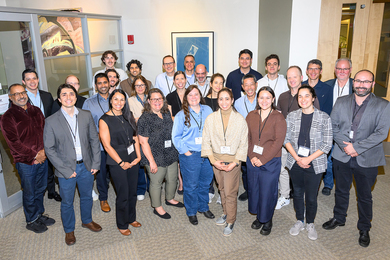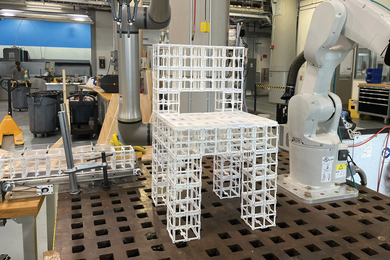The Cambridge-MIT Institute (CMI) has launched an initiative to promote innovation in the entire communications industry.
CMI's Communications Innovation Institute will unite three universities on both sides of the Atlantic with industrial partners in computing and telecommunications as well as policy-makers. Together they will tackle some of the major challenges blocking new innovation in communications technology.
With the rapid convergence of computing and communications, the communications industry must deal with disruptive changes including technical innovation, social demands and economic concerns, to move forward in a coordinated fashion. This is the motivation behind the Communications Innovation Institute (CII).
CII will develop some of the emerging technologies of the future, such as third-generation peer-to-peer systems, testing of wireless-on-optical technology and methods for tackling Internet piracy.
Social and economic issues will also be explored, as these cannot be separated from technological innovation. These will include designing roadmaps for wireless, radio frequency spectrum and broadband usage.
Several questions will be addressed along the way, including: Are government auctions the best way to encourage efficient use of the radio frequency spectrum? Is pricing the best way to control Internet congestion? Can we design new Internet architectures for routing and addressing that protect users from spam and attack?
"At its best, innovation on the Internet can be fast and powerful. Look at the growth of the game industry," said David Clark, a senior research scientist in MIT's Computer Science and Artificial Intelligence Lab and one of CII's principals. "At worst, there is seemingly no progress at all. Why? What are the causes? When we look at tough issues, such as better security or broadband deployment, we see that the issues are not a lack of technical innovation but the inability to agree and plan a path forward.
"Until now, communications research and the industry it serves have been plagued by the 'stovepipe' phenomenon. Classical academic research is partitioned into different labs and departments, and separate from industrial technology labs, business schools, government departments and so on. We felt we needed to change this and provide a new structure that ties these different disciplines together," Clark said.
"We need to note how economic, regulatory and technical concerns interact," added Jon Crowcroft, the Marconi Professor of Networked Systems in the University of Cambridge's Computer Laboratory and another CII principal. "We can't consider each of these in isolation any more. Some things are not solved by the market or by the government, or by Microsoft, Intel and Cisco, or small businesses or research labs or startups on their own."
"The communications industry is about to change as significantly as computing did with the PC," said Andy Lippman, a senior research scientist in MIT's Media Lab and CII team member. "Programmability at the ends, be they TVs or telephones, allows the users to become the inventors. Just as spreadsheets came from PC users, communications innovations will come from user-inventors. They outnumber companies 100 to 1.
"How do you measure the other surprises waiting to be born that can happen when communications users become inventors? Will it be the dog collar that buzzes when you want your dog to come home? Will it be movies and messages you get as you walk through parks and past monuments? Will it be personal phone exchanges? We don't know. But we are sure that old standards, such as video on demand and call waiting, will seem dull in comparison," Lippman said.
The Cambridge-MIT Institute is a joint venture between the University of Cambridge and MIT that works to enhance competitiveness, productivity and entrepreneurship in the United Kingdom. The initiative will involve researchers from the University of Cambridge, MIT and University College in London, along with partners in industry and government.





